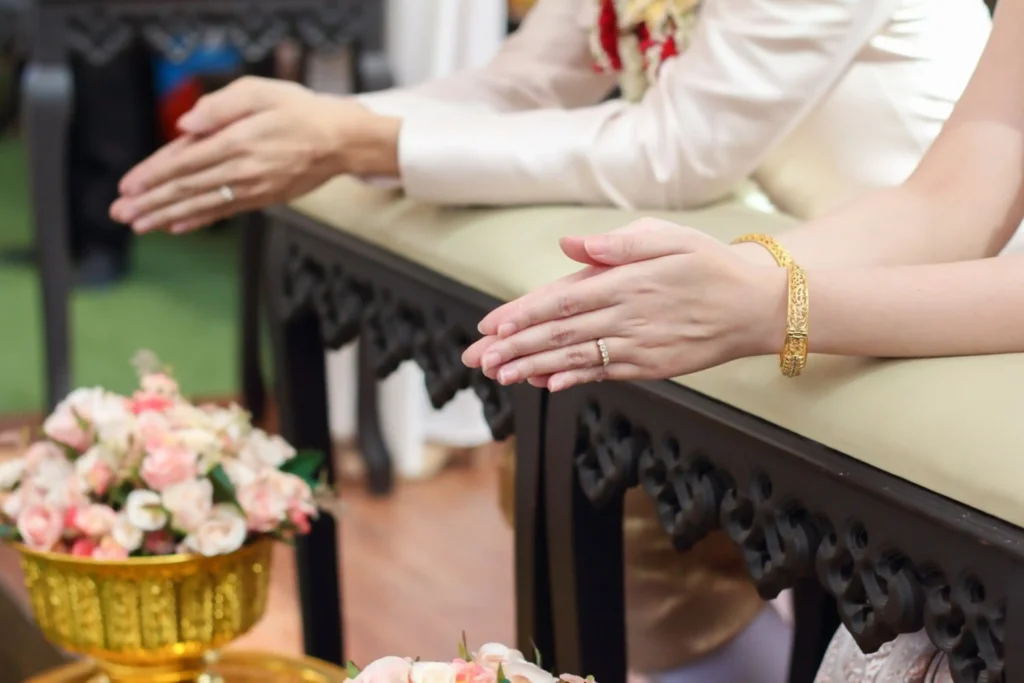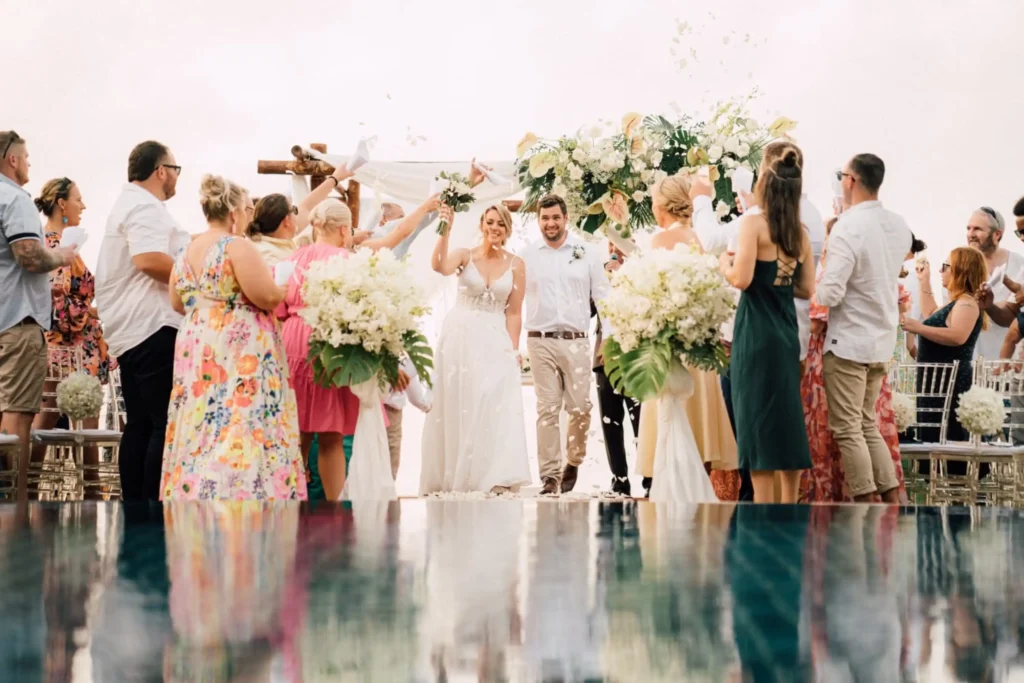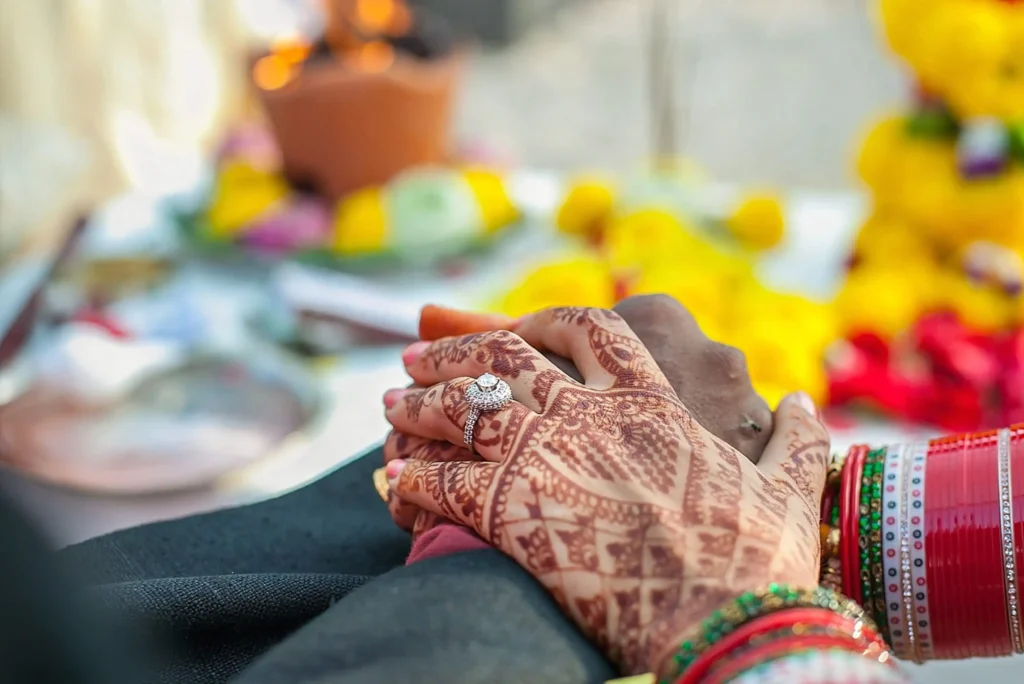
Thai Traditional Wedding Ceremony

Thai traditional weddings are deeply spiritual and family-cantered, rooted in Buddhist customs. They typically begin with a Buddhist blessing by monks and incorporate symbolic rituals like the “Rod Nam Sang” (water-pouring ceremony). The date and time are often chosen based on auspicious astrology.
**Key Ceremony Elements**:
– **Monk Blessing**: The day often starts with a blessing from Buddhist monks, who chant prayers and bestow blessings on the couple.
– **Sin Sod Ceremony**: The groom presents a dowry to the bride’s family, symbolizing respect and commitment.
– **Khan Maak Procession**: A traditional parade where the groom’s family brings gifts to the bride’s family, often accompanied by music and dancing.
– **Rod Nam Sang Ceremony**: Family and friends pour water over the couple’s hands, offering blessings for their marriage.
**How a Wedding Planner Helps**:
– **Cultural Coordination**: A wedding planner well-versed in Thai traditions can help coordinate the timing of each ritual to ensure everything flows smoothly, from the monk blessing to the water-pouring ceremony.
– **Vendor Management**: Thai weddings often involve specific needs, such as monks for blessings, traditional attire, and special décor like flower garlands. A planner can ensure all these elements are arranged, ensuring that the ceremony aligns with cultural customs.
– **Family Coordination**: In Thai weddings, family plays a central role. The planner helps guide family members and guests through the rituals, ensuring they understand their part in the water-pouring ceremony or Khan Maak procession.
– **Astrological Planning**: If desired, a planner can help consult with monks or astrologers to set the most auspicious date and time for the ceremony, adding to the overall authenticity and harmony of the day.
Western Wedding Ceremony

Western weddings tend to be a more straightforward simplistic ceremony , focusing on the exchange of vows, rings, and other symbolic gestures. The ceremony can be secular or religious, depending on the couple’s preference, and often includes symbolic elements like lighting a unity candle or reading meaningful passages.
**Key Ceremony Elements**:
– **Vows and Ring Exchange**: The core of a Western wedding is the exchange of vows, where the couple promises their commitment to each other, followed by exchanging rings.
– **Unity Rituals**: Some couples choose to incorporate unity candles, sand ceremonies, or other symbolic gestures to represent their union.
– **Officiant Guidance**: A priest, minister, or civil officiant usually guides the ceremony, adding personal elements or readings to make it meaningful.
– **Wedding Procession**: A formal entrance, often with the bride escorted down the aisle, followed by the couple’s exit as they are pronounced married.
**How a Wedding Planner Helps**:
– **Ceremony Structure & Personalization**: A wedding planner can help the couple customize their ceremony to reflect their personalities and beliefs. They can suggest unity rituals, readings, or unique personal touches, ensuring a memorable experience.
– **Venue Setup & Décor**: Western weddings often require specific seating arrangements, aisle décor, and lighting. A planner can manage these details to create a cohesive look that aligns with the couple’s vision.
– **Coordination with Officiant**: A planner liaises with the officiant to ensure that the ceremony timing and flow are followed. They also handle the legal paperwork, helping the couple sign and submit their marriage certificate.
– **Guest & Family Guidance**: Planners can help coordinate the bridal party procession, direct guests to their seats, and ensure that family members are where they need to be during key moments like walking the bride down the aisle.
Indian Wedding Ceremony

Indian weddings are colorful and vibrant, involving multiple symbolic rituals rooted in religious and cultural traditions. Ceremonies differ greatly by region and religion, from Hindu “Pheras” (sacred fire ritual) to Sikh and Muslim customs. Most Indian weddings are multi-day affairs with pre-wedding events, a main ceremony, and a grand reception.
**Key Ceremony Elements**:
– **Mandap Setup**: Hindu weddings take place under a decorated canopy (Mandap) where the sacred rituals are performed.
– **Pheras (Hindu Tradition)**: The couple walks around a sacred fire seven times, each round symbolizing a different aspect of marriage.
– **Kanyadaan and Sindoor**: Parents “give away” the bride (Kanyadaan), and the groom places sindoor (vermillion) on the bride’s forehead, symbolizing marriage.
– **Baraat**: A lively procession where the groom arrives with family and friends, often on horseback or with a DJ or band.
– **Religious Variations**: Sikh weddings include circling the Guru Granth Sahib (holy book), while Muslim Nikah involves reading vows in the presence of witnesses.
**How a Wedding Planner Helps**:
– **Ritual Management**: Indian weddings have numerous intricate rituals that must be done in a specific order. A planner experienced in Indian weddings can organize and manage each step, from the baraat procession to the phera ceremony, ensuring cultural respect and tradition.
– **Vendor Coordination**: Indian weddings require unique elements like a Mandap, specialized attire, traditional musicians, and specific decor. A planner can manage these details, ensuring all necessary elements are in place and styled according to tradition.
– **Multi-Day Event Organization**: With multiple events across several days (e.g., Mehendi, Sangeet, and Reception), a planner coordinates everything from guest itineraries to vendor schedules, so each event flows seamlessly into the next.
– **Guest Accommodations**: Indian weddings often have a large guest list, sometimes including extended family and friends from afar. A planner can manage travel logistics, accommodations, and special guest services, ensuring everyone has a smooth experience.
Why Choose a Wedding Planner for Your Ceremony?
Each type of wedding ceremony has unique needs, and a wedding planner brings expertise, organization, and cultural sensitivity to each step of the process:
– **Smooth Coordination**: A planner orchestrates the entire ceremony timeline, managing the setup, rituals, and guest experience, ensuring that nothing is missed.
– **Vendor and Décor Expertise**: Planners have the connections to source authentic decor and specialized vendors who understand each culture’s requirements.
– **Family and Guest Guidance**: For weddings involving multiple rituals, a planner assists family and guests so they know where to be and when, allowing everyone to fully enjoy the celebration without stress.
– **Cultural Authenticity**: For culturally specific weddings, a planner ensures each tradition is respected, creating an authentic, meaningful experience.
This breakdown on our website can help couples see how hiring us as a wedding planner simplifies the planning process, whether you’re opting for a Thai, Western, or Indian ceremony. By highlighting our role in managing your unique rituals and traditions, you provide value for couples looking to enjoy a stress-free, beautifully coordinated wedding.